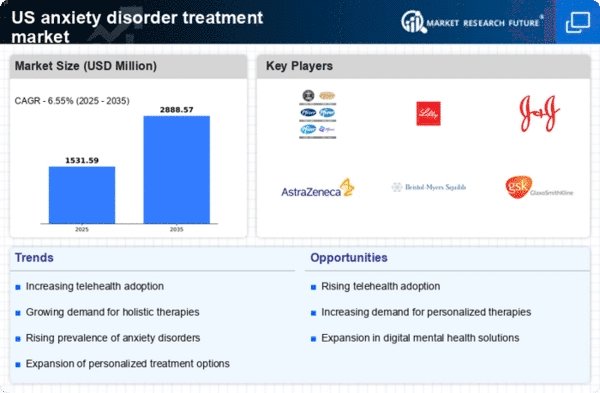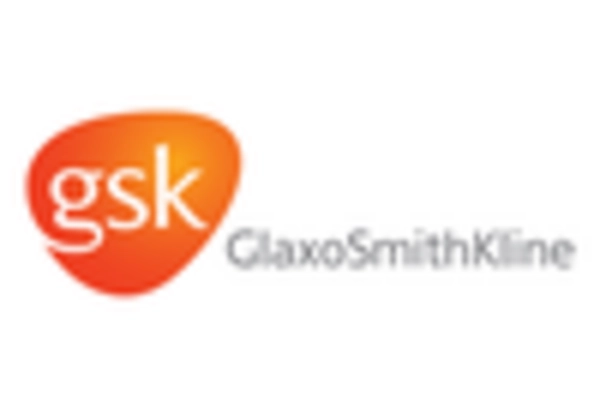Increased Awareness and Education
The anxiety disorder-treatment market is benefiting from increased awareness and education surrounding mental health issues. Campaigns aimed at destigmatizing mental health conditions have led to a greater understanding of anxiety disorders among the general public. This heightened awareness is encouraging individuals to seek treatment, thereby driving demand within the market. Educational initiatives, particularly in schools and workplaces, are fostering environments where mental health is prioritized. As a result, the anxiety disorder-treatment market is likely to expand, with more individuals recognizing the importance of addressing their mental health needs and seeking appropriate therapeutic interventions.
Advancements in Pharmaceutical Treatments
The anxiety disorder-treatment market is significantly influenced by advancements in pharmaceutical treatments. Recent developments in psychotropic medications, including selective serotonin reuptake inhibitors (SSRIs) and benzodiazepines, have improved treatment outcomes for patients. The market for these medications is projected to reach approximately $10 billion by 2026, reflecting a compound annual growth rate (CAGR) of around 5%. These advancements not only enhance the efficacy of treatments but also contribute to the growing acceptance of pharmacological interventions among healthcare providers. As new drugs enter the market, the anxiety disorder-treatment market is expected to evolve, offering patients a wider array of options tailored to their specific needs.
Increasing Prevalence of Anxiety Disorders
The anxiety disorder-treatment market is experiencing growth due to the rising prevalence of anxiety disorders in the United States. Recent estimates indicate that approximately 19.1% of adults experience anxiety disorders annually, leading to a heightened demand for effective treatment options. This increasing prevalence is prompting healthcare providers to seek innovative therapies and interventions, thereby expanding the market. Furthermore, the societal impact of anxiety disorders, including lost productivity and increased healthcare costs, underscores the urgency for effective treatment solutions. As awareness of mental health issues continues to grow, the anxiety disorder-treatment market is likely to see further expansion, driven by the need for accessible and effective therapeutic options.
Integration of Behavioral Health in Primary Care
The anxiety disorder-treatment market is being shaped by the integration of behavioral health services into primary care settings. This approach allows for a more holistic treatment of patients, addressing both physical and mental health needs simultaneously. Research indicates that approximately 70% of individuals with anxiety disorders receive treatment in primary care settings, highlighting the importance of this integration. By facilitating access to mental health services, primary care providers can play a crucial role in the early identification and management of anxiety disorders. This trend is likely to enhance the overall effectiveness of treatment and expand the anxiety disorder-treatment market as more patients receive timely and comprehensive care.
Growing Demand for Personalized Treatment Options
The anxiety disorder-treatment market is increasingly driven by the growing demand for personalized treatment options. Patients are seeking therapies that are tailored to their unique needs, preferences, and genetic profiles. This shift towards personalized medicine is prompting healthcare providers to adopt more individualized approaches in treating anxiety disorders. Recent studies suggest that personalized treatment plans can lead to improved patient outcomes and satisfaction. As the market evolves, the emphasis on personalized care is likely to foster innovation in treatment modalities, including pharmacogenomics and customized therapy regimens, thereby enhancing the overall effectiveness of the anxiety disorder-treatment market.
.png)
















